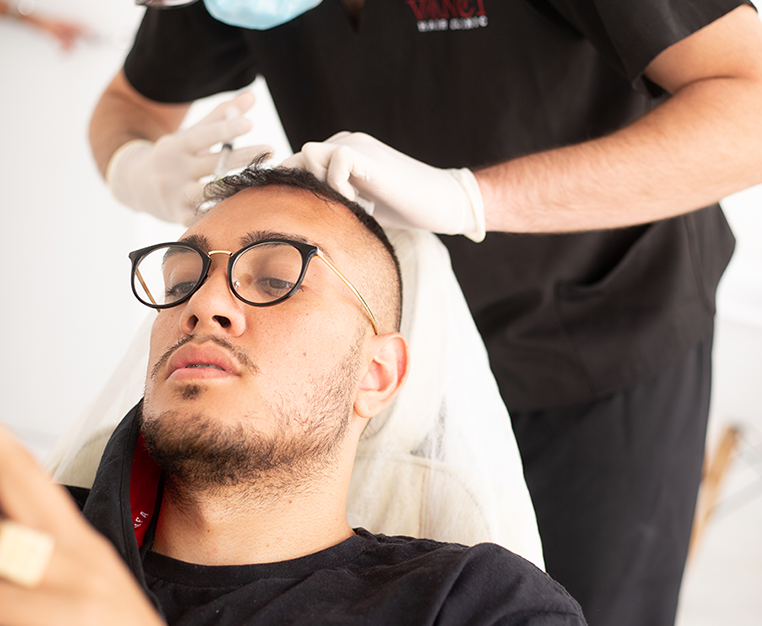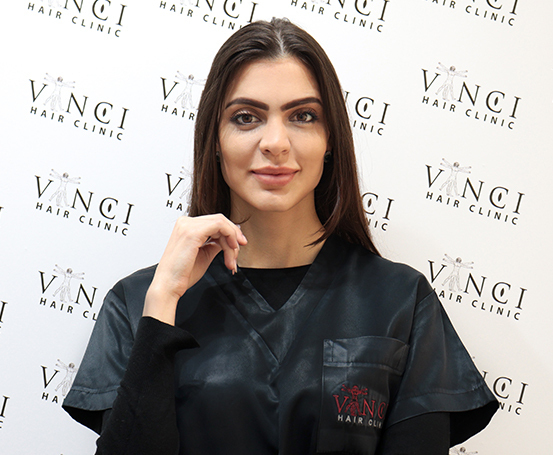Hair loss is a common problem that affects many people, especially as they get older. It can have different causes, such as genetics, hormones, stress, illness, or medication.
Regardless of how you lose it, hair loss can make you feel self-conscious, unhappy, or less confident. If you are looking for a solution to restore your hair and your appearance, you may want to consider microscalp pigmentation (MSP).
What is microscalp pigmentation?
Microscalp pigmentation is a cosmetic procedure that creates the appearance of fuller hair by camouflaging tiny dots of pigment on your scalp. The dots look like hair follicles that have been shaved or buzzed.
Microscalp pigmentation can cover thinning areas, bald spots, scars, or receding hairlines. It can also create a natural-looking hairline or a shaved head look.
Microscalp pigmentation is different from microblading, which is a technique that draws hair-like strokes on the eyebrows. Microscalp pigmentation uses smaller and thinner needles, and different types of pigments, to match your hair color and skin tone. Microscalp pigmentation also lasts longer than microblading, as it does not fade as quickly.
How does microscalp pigmentation work, and who can benefit from it?
Microscalp pigmentation works by depositing medical-grade pigments into the middle layer of your skin, where your hair roots are. The pigments are applied with an electric device, which has a special needle that can adjust the depth, speed, and pressure of the injection. The pigments are customised to suit your hair color, skin tone, and desired density. The dots are layered and blended to create a realistic and natural effect.
Microscalp pigmentation can benefit anyone who suffers from hair loss, regardless of the cause, type, or extent of the condition. It can help people who have:
- Male or female pattern baldness, which is caused by genetics and hormones.
- Alopecia areata, which is an autoimmune disorder that causes patchy hair loss.
- Telogen effluvium, which is a temporary hair loss caused by stress, illness, or medication.
- Chemotherapy-induced hair loss, which is a side effect of cancer treatment.
- Scarring alopecia, which is a permanent hair loss caused by injury, infection, or inflammation.
Microscalp pigmentation can also enhance the results of other hair restoration treatments, such as hair transplants, PRP, or laser therapy. It can fill in the gaps between the transplanted hairs, camouflage the scars from the surgery, and add more density and definition to the hairline.
Does it hurt? What’s the process like?
Microscalp pigmentation is a minimally invasive and relatively painless procedure, but it may cause some discomfort depending on your pain tolerance and sensitivity. Before the procedure, your MSP practitioner will apply a topical numbing cream to your scalp to reduce the sensation. You may also take over-the-counter painkillers to ease the pain.
The procedure usually takes several sessions, each lasting between two and four hours, depending on the size of the area to be treated. The first session is the longest, as it involves creating the base layer of the pigmentation.
The subsequent sessions are shorter, as they involve adding more details and depth to the pigmentation. The sessions are spaced about a week apart, to allow the scalp to heal and the pigments to settle.
Before the procedure, you will have a consultation with your MSP practitioner, who will assess your scalp condition, hair loss pattern, hair color, skin tone, and expectations. You will also discuss the design of your hairline, the shape of your scalp, and the density of your pigmentation. Your MSP practitioner will draw a mock-up of your desired outcome on your scalp, and show you some before and after photos of previous clients. You will also have a patch test to check for any allergic reactions to the pigments.
What are the benefits of microscalp pigmentation?
Microscalp pigmentation has many benefits as a hair loss solution, such as:
- It is a simple and quick procedure, which does not require surgery, anesthesia, or downtime.
- It is a permanent and low-maintenance solution, which does not require touch-ups, products, or styling.
- It is a realistic and natural-looking solution, which matches your hair color, skin tone, and hair density.
- It is a safe and hygienic solution, which uses sterile equipment, medical-grade pigments, and strict protocols.
- It is an affordable and cost-effective solution, which has a one-time fee and no hidden charges.
Conclusion
Microscalp pigmentation is a promising technique that can help you stop hair loss and grow more hair by surgically placing tiny dots of pigment on your scalp. Microscalp pigmentation has many benefits, such as being simple, permanent, realistic, safe, and affordable.
However, microscalp pigmentation also has some risks and side effects, such as bruising, infection, headache, or allergic reaction. Therefore, it is important to consult with a reputable MSP practitioner who can evaluate your condition and recommend the best treatment for you.
If you are interested in microscalp pigmentation or other hair loss solutions, consider Vinci Hair Clinic, a leading provider of hair restoration services, with over 15 years of experience and clinics in 13 different countries.
Vinci Hair Clinic offers a range of services, such as hair transplants, micro scalp pigmentation, and scalp microneedling to help you restore your hair and confidence.
Don’t let hair loss stop you, take action today and visit Vinci Hair Clinic to find out the best solution for you.



